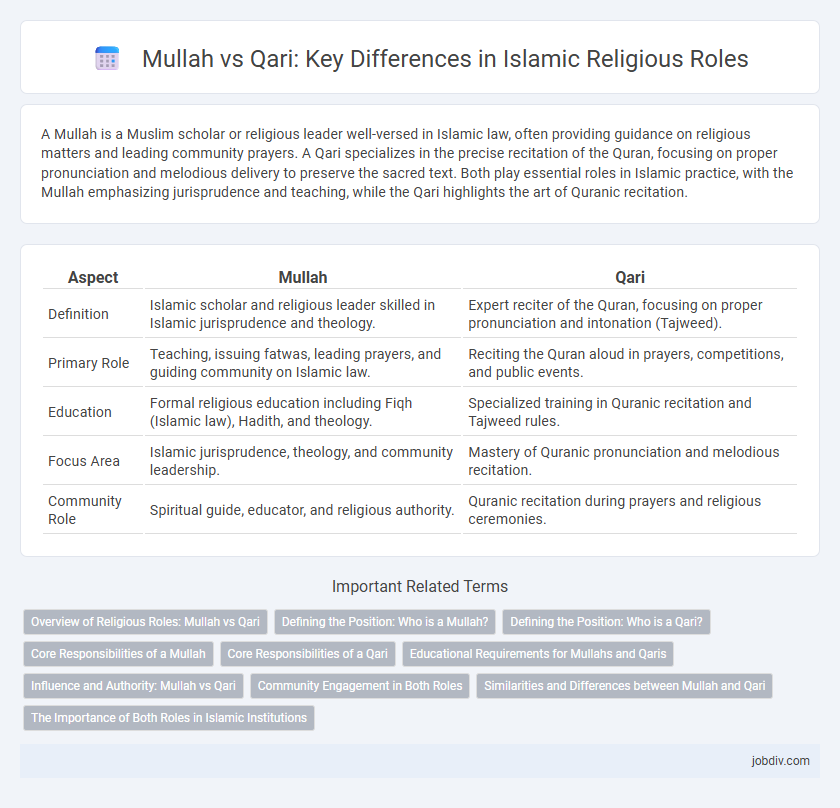A Mullah is a Muslim scholar or religious leader well-versed in Islamic law, often providing guidance on religious matters and leading community prayers. A Qari specializes in the precise recitation of the Quran, focusing on proper pronunciation and melodious delivery to preserve the sacred text. Both play essential roles in Islamic practice, with the Mullah emphasizing jurisprudence and teaching, while the Qari highlights the art of Quranic recitation.
Table of Comparison
| Aspect | Mullah | Qari |
|---|---|---|
| Definition | Islamic scholar and religious leader skilled in Islamic jurisprudence and theology. | Expert reciter of the Quran, focusing on proper pronunciation and intonation (Tajweed). |
| Primary Role | Teaching, issuing fatwas, leading prayers, and guiding community on Islamic law. | Reciting the Quran aloud in prayers, competitions, and public events. |
| Education | Formal religious education including Fiqh (Islamic law), Hadith, and theology. | Specialized training in Quranic recitation and Tajweed rules. |
| Focus Area | Islamic jurisprudence, theology, and community leadership. | Mastery of Quranic pronunciation and melodious recitation. |
| Community Role | Spiritual guide, educator, and religious authority. | Quranic recitation during prayers and religious ceremonies. |
Overview of Religious Roles: Mullah vs Qari
Mullahs serve as Islamic scholars and community leaders responsible for teaching Islamic law, conducting religious ceremonies, and providing spiritual guidance based on the Quran and Hadith. Qaris specialize in the recitation of the Quran, mastering Tajweed rules and delivering melodious, precise readings that enhance worship experiences and religious gatherings. Both roles play crucial parts in preserving and promoting Islamic teachings, with Mullahs focusing on jurisprudence and community leadership, while Qaris emphasize the oral tradition and artistic recitation.
Defining the Position: Who is a Mullah?
A Mullah is a Muslim religious scholar trained in Islamic theology, jurisprudence, and law, often serving as a spiritual leader or teacher within the community. Unlike a Qari, who specializes primarily in the precise recitation and memorization of the Quran, a Mullah's role encompasses delivering sermons, interpreting Sharia law, and providing religious guidance. This position holds significant social and educational responsibilities, shaping religious understanding and practice among followers.
Defining the Position: Who is a Qari?
A Qari is a person expertly trained in the correct pronunciation and melodious recitation of the Quran, following the precise rules of Tajweed. Unlike a Mullah, who is often a religious scholar or leader involved in teaching Islamic jurisprudence and theology, a Qari specializes specifically in the art of Quranic recitation. The role of a Qari is crucial in preserving the oral tradition of the Quran and inspiring spiritual connection through vocal expression.
Core Responsibilities of a Mullah
A Mullah primarily serves as an Islamic scholar responsible for interpreting Sharia law, leading prayers, delivering sermons (khutbahs), and providing religious guidance to the community. They often conduct religious education, officiate Islamic rituals such as marriages and funerals, and offer spiritual counseling based on Quranic teachings and Hadith. This contrasts with a Qari, whose core responsibility centers on the precise and melodious recitation of the Quran during prayers and religious events.
Core Responsibilities of a Qari
A Qari's core responsibility is the precise and melodious recitation of the Quran, emphasizing correct Tajweed rules and pronunciation to preserve the text's integrity. Unlike a Mullah, who often leads prayers, provides religious rulings, and educates in broader Islamic jurisprudence, a Qari specializes in vocal delivery and memorization of the Quranic verses. Their role is essential in maintaining the oral tradition and spiritual ambiance during Islamic rituals and ceremonies.
Educational Requirements for Mullahs and Qaris
Mullahs typically undergo extensive religious education, including memorization of the Quran, Islamic jurisprudence (fiqh), and Hadith studies, often through madrasas or Islamic seminaries. Qaris primarily focus on mastering Quranic recitation techniques, Tajweed rules, and vocal training to ensure accurate and melodious Quranic recital. The educational path for Mullahs is broader and more comprehensive, encompassing religious leadership and legal knowledge, while Qaris specialize in the art and science of Quranic chanting.
Influence and Authority: Mullah vs Qari
Mullahs hold significant religious authority as Islamic scholars responsible for leading prayers, delivering sermons, and interpreting Sharia law, often influencing local communities' social and spiritual governance. Qaris, recognized primarily for their mastery in Quranic recitation, exert influence through their vocal skills and ability to inspire devotion and memorization of the Quran. While Mullahs possess broad religious and judicial authority, Qaris command respect mainly in devotional contexts and the preservation of Quranic traditions.
Community Engagement in Both Roles
Mullahs and Qaris both play vital roles in Islamic communities, with Mullahs primarily offering religious guidance, leading prayers, and resolving community issues through their deep understanding of Sharia law. Qaris engage the community by reciting the Quran with precise tajweed, inspiring spiritual reflection and fostering a collective connection to the sacred text. Their combined efforts strengthen community cohesion, enhance religious education, and promote active participation in Islamic practices.
Similarities and Differences between Mullah and Qari
Mullah and Qari both hold significant religious roles in Islam, with the Mullah primarily serving as a scholar or teacher of Islamic law and theology, while the Qari specializes in the recitation of the Quran with proper tajweed rules. Both are respected for their knowledge of Islamic teachings and contribute to religious education and community guidance. The key difference lies in their focus areas: Mullahs provide jurisprudential and doctrinal instruction, whereas Qaris emphasize the art and practice of Quranic recitation.
The Importance of Both Roles in Islamic Institutions
Mullahs serve as Islamic scholars and community leaders, responsible for interpreting religious texts, delivering sermons, and guiding moral and social matters. Qaris specialize in the precise and melodious recitation of the Quran, preserving the oral tradition and enhancing spiritual experiences during prayers and ceremonies. Both roles are essential in Islamic institutions, fostering religious education, spiritual growth, and the dissemination of Islamic knowledge.
Mullah vs Qari Infographic

 jobdiv.com
jobdiv.com